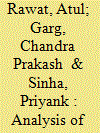| Srl | Item |
| 1 |
ID:
192705


|
|
|
|
|
| Summary/Abstract |
The environmental impact of the transport sector has a significant contribution in the carbon emissions. To reduce fossil fuel consumption and promote clean fuel, many countries are considering hydrogen as an alternative fuel and a bridge to sustainable development and achieve net zero target. Indian government has taken multiple policy initiatives to promote hydrogen fuel adoption in India. But nevertheless, the major presence of the multiple barriers limits the mass adoption of hydrogen as a preferred fuel. Therefore, identification and assessment of the key internal and external barriers of the hydrogen fuel vehicles adoption is required to mitigate the climate change issues. This study has identified and analyzed the barriers. The criticality assessment of the barriers is done by fuzzy based hybrid approach analytic hierarchy process. Later, sensitivity experiments are conducted to verify the robustness of the model. The findings of the study show that technical barriers are most critical barriers in the adoption of hydrogen fuel vehicles in India. The result of the study also indicates that India would require to build the hydrogen supply network and infrastructure, improve consumer awareness, favourable policies and develop efficient production technology for the mass adoption of hydrogen as a fuel.
|
|
|
|
|
|
|
|
|
|
|
|
|
|
|
|
| 2 |
ID:
180866


|
|
|
|
|
| Summary/Abstract |
Natural gas considers as the fuel for the 21st century and is expected to play an important role in the developing countries' energy mix due to clean fuel, environmental, climate goals and sustainability issues. India too is striving for increasing the natural gas share from 6.2% in 2019 to 15% by 2030. Government of India is also stressing to boost natural gas share in the country's energy mix, which is still below the desired level and presence of the barriers makes it difficult to establish natural gas as preferred fuel in this country. Therefore, it is imperative to analyze the criticality of the barriers to understand how they impact on the natural gas market of India. The study employs a two-phase methodology to identify and analyze the critical barriers restricting the natural gas demand in India by employing novel hybrid best-worst method (BWM). The results indicate that operational and supply related barriers are the two most critical out of the identified categories. The findings of the developed framework could be used by the policymakers, strategists and the managers, which will help them to reduce and eliminate the barriers and promote natural gas as the preferred fuel.
|
|
|
|
|
|
|
|
|
|
|
|
|
|
|
|